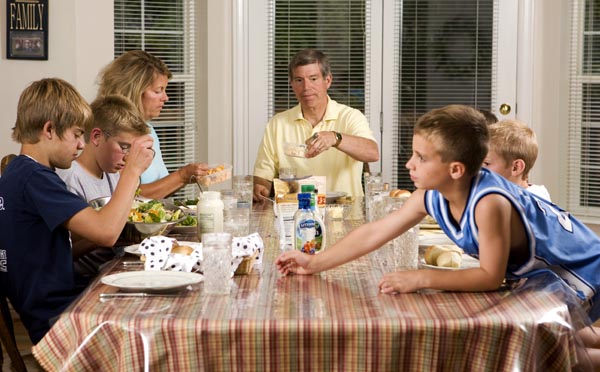Importance of Family Time on Kids Mental Health and Adjustment to Life

Importance of Family Time on Kids Mental Health and Adjustment to Life
The goal of every parent is to raise a happy and well-adjusted child. There are thousands of books which provide information and advice on raising children successfully. Experts in their respective fields strive to give parents the most up to date information whether it is about health, nutrition, child development, education, or parenting.

However, one simple truth is often overlooked: Children from birth to adulthood need time and attention from their parents. Sometimes parents become so anxious to raise a “successful” child that they overlook the importance of spending time interacting personally with their child or children. This does not mean rushing from school to extracurricular activity to supervising homework. Interactive time is that spent with both child and parent fully engaged in an activity together. The importance of this time is multifold.
- The child feels important and loved.
- He or she has an opportunity to model parent’s behavior.
- The parent can observe and learn about the child’s strengths and weaknesses in order to better guide them.
- The child has a chance to voice their thoughts and feelings.
- The parent and child develop a stronger bond.
The U.S. Department of Health and Human Services Substance Abuse and Mental Health Administration has developed a program called “Building Blocks for a Healthy Future” that is focused on the importance of family in reduce the incidence of emotional and behavioral problems in children and focuses on starting this process as early as age three. They report seven steps to a healthy parent-child relationship which highlight the importance of spending time with family to foster communication, provide positive reinforcement, role model, teach social skills, and to bond.
Multiple studies reveal that children are much more likely to develop emotional and behavioral disorders when they receive inadequate or poor parenting and each study uses the foundation of spending quality time with children as the first vital step to successful parenting.
Activities that will promote happy and healthy children are innumerable and don’t have to be expensive or difficult to access. The key is to give the child your full attention and vice versa. Here are some suggestions to get started.
- Family meal time. This could become a family event from the selection of the menu, preparing the food and table, serving, eating together, and cleaning up. During the meal, children and adolescents can be encouraged to talk about what is interesting to them, and not necessarily the usual topics like school and work.
- Homework. If parents can spend positive time with their children without conflict, this can be a good bonding experience where the school work itself is just a means to the end.
- Sports. Whether it is playing catch in the yard, going to the gym, or watching the child play or perform, active and positive involvement is rewarding.
- Hobbies such as drawing, crafts, collecting are great fodder for conversation.
- Board games and cards allow for the family to relax and enjoy each other’s company.
- Extracurricular activities such as Girl/Boy Scouts, 4H, or the debate team, can be a great opportunity for bonding.
- Religious activities.
- Shopping with the family can make a simple chore an event.
- Attend a concert or show together.
- Go to the theater, watch television, or rent movies. By watching some shows your child enjoys, you will learn more about him/her and can use the topics brought up for more interesting discussions.
- Outdoor activities such as hiking, walks, bicycling, picnics, or camping.
- Attend school events together.
- For younger children, get in the habit of reading to them. For the adolescent, ask what book they are reading and then read it yourself. In both cases, engage the child in a discussion about the book.
In summary, family time should be a fun and enjoyable way to raise healthy and happy children that love and feel loved. Then the child will know that “matter” and this will be reflected in their life choices.

